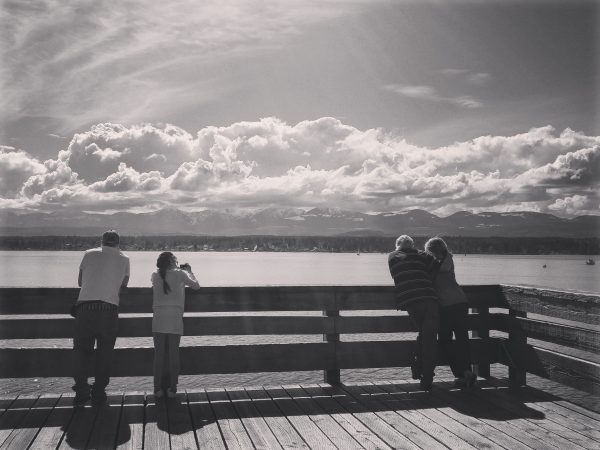As we get older, we are often reminded of our mortality, our fragility, and the inevitable end of this journey.
As relationships, friends, family members, and memories fade and fall away, we quietly posit and define chapter headings to our story. Every milestone initiates a recapitulation, as we inevitably, and perhaps unexpectedly, check in with ourselves. Are we living our real and true mission? Is this all there is to life? How much time do we have left?
Faced with the reality that we observe in our aging elders, how time ravages their bodies, or worse, their minds, we don’t want to admit to ourselves this is what could be in store for us. How can someone who was once a giant, and so full of life, now be inescapably reduced to a shrinking, hunched shadow of their former selves, struggling even to walk, to think clearly, or to climb a set of stairs?
Yesterday, I was five. Soon, I’ll be fifty. The numbers don’t compute, and are rather immaterial, as they don’t measure anything but the superficial linear notion of the passage of time. They don’t measure how much I have lived through, or whether I’ve dared to live beyond my self-imposed limitations. The accumulated years tell me nothing about my accomplishments, of dreams that I’ve pursued, or of those meaningful relationships and personal challenges I have given up on, or forever deferred and delayed. They’re just numbers.

Injuries of my youth more frequently interject and interfere with my physicality and movement. Old aches and pains have been around for decades now, rather than weeks and months. Is that all due to my lack of healing? Is it emotional baggage? Am I forever holding on to unresolved trauma? Is it because I expect them to be there every morning when I awake? Is it the informed, auric field within which I live day-to-day, that reaffirms itself as my mind engages the repetition and routine that persists from yesterday, and yesterday, and yesterday?
Undoubtedly, it is all of these things, entangled and enmeshed.
We tend to passionately defend and hold close to us our identities and personality constructs. We believe these etheric instruments essential to “knowing who we are” and thus can never let them be too far away. Injury goes both beyond, and far deeper than, the physical body. This temple, this vessel… this transitory personal conveyance, houses such an infinitude of varied data, it defies quantification. Our bruises, wounds, and scars may offer us tangible qualifications, social awards, and intrinsic emotional and psychological rewards, but these minor benefits serve only as further codification for what we believe our life is meant to be, and how we perceive it to be playing out. “War wounds,” put more poetically, become identity markers, predominant factors in the story we live, and present to the world around us. The more they are affirmed and echoed by others, the more we may rely upon them to define ourselves… and the more we will limit ourselves to that same, stunted framework.
There are all manner of severe limitations we can live out, based upon these adopted story elements – and if we’re not careful, they’ll convey us blindly, unconsciously, right through to the end. Whether that is good or bad, fruitful or sad, is ultimately up to the individual. I believe critical self-awareness demands we break through these barriers, time and again, as we grow and integrate inward, and propel ourselves along our purposeful trajectory. Many of us know the ugly feeling of a life that has stagnated and gone nowhere for too long. And we all know how we may project these inner battles onto those we care about, wishing they were more this, or that, when it has nothing to do with them whatsoever.
Whether they pass on, or there’s a breakup, or separation otherwise, that emotional outlet abruptly goes away with them. What remains is an inconvenient conundrum, and an ideological conflict. In our mourning, we may finally see the truth, and therein we may find catharsis, resolution, and admission. A profound and timely message surfaces from within our heart, and while there may be tears, anger, a feeling of injustice, or bitter betrayal, a knowing smile must also emerge. Through the brief respite of uncommon humility, we discern that there is something more there, something fundamental and deeply stirring. If we are able to receive this time-sensitive gift, we may offer ourselves an opportunity to expand on what came before, on who we were up until now.

It is only through relationship that we may mature in these character-defining agencies. Without the mirror, the reflection, the extrinsic sounding board, our internalized echo chamber and reality-making machinations may drive us to a suboptimal, self-defeating madness. If we are ever to glean our potentials for meaningful and purposeful living, we need the other; we need varying and changing and unpredictable inputs; we need those up to the task, up to the challenge of meeting us head-on, able to distill, or bestill and set aside the noise, to upset the debilitating complacency engendered both through stubbornness, and indecisiveness; we need that ephemeral polarity, adequate to our strengths, and frequently enough to keep us on our toes, or the only question that will ring loudly, and uncomfortably, is “what’s the point?”
. . .
This year has introduced important milestones to my journey. My aging father went into the hospital in January, after suffering a nearly fatal health crisis. My friend, who’d visited him as often as time permitted, tried to put it to me gently: “I don’t want to scare you, but you should come.” I was living on Vancouver Island at the time, having moved away from the area I’d grown up in, again, for about five-and-a-half years. I hadn’t been back at all in nearly three years. Having just renewed the lease on a tiny little apartment, I was formulating a plan for the coming year, not that I was ever good at making plans. But, things changed dramatically. When I came back for a week to see my dad, I wasn’t sure what to expect. But it became immediately clear that he couldn’t be on his own anymore. At least, not for the foreseeable future.
My first visit to the hospital was a stark reminder of the utter reality we may bravely think we can do anything about, regarding how our bodies, at some point, tend to wither and fade away, perhaps well before our spirit is ready to move on. That’s conjecture, of course, but I can’t understand the point of dragging on, hoping for better days, waiting for miracles, or saviors, when it’s clear that some part of us is done with it all.
He was so small, frail, and weakened, that I was taken aback. The shock of it was rattling, as I was now standing quite tall over him. I put on a brave face, as I knew he was both very happy to see me after several years, and that his remnants of pride forced him to sit up, and to reassure me, with a quiet, “Don’t worry, OK?”
He pulled through. And for the next four months, I stayed with him. I made sure he ate proper breakfasts, took his meds, and got some exercise. For a while, things seemed to be on the up and up. But, the clock had been set, and there was nothing to do about it except go through the motions.
Just as I had started to transition again into my own place, having rented a fixer-upper only a few blocks away, suddenly, and perhaps mercifully, he was gone. I knew he hadn’t really been enjoying his daily life anymore, though he did have lucid and energized moments wherein he tried to engage in hobbies and habits from only a few years ago. But his body just couldn’t do for him what he wanted it to do anymore. It was heartbreaking, but quite revealing. Everything was a lesson, and a reminder. The daily regimen had given him a minor spark, and my presence had given him someone to be accountable to, but something profoundly fundamental was noticeably absent. We’d had our father-son reunion, and I was there for the dramatic ending, which is what he’d wanted. He was not alone, and that I, his son, was there to see him off, was likely an answer to a quiet, private prayer.

That moment, that singular event, has changed me forever. I’ve witnessed other relatives pass on, but this was different. Now, there is no one who stands behind me, in the way a father’s presence does, even at a distance. While I can complain that he’d left much to be desired in that regard, I don’t know that he did anything fundamentally “wrong”. He made any number of compromises and accommodations for myself and my sister throughout the years, and not having any children of my own, I have no right to comment or judge him for any of it now. For various reasons, throughout the years, I’ve unconsciously attempted to substitute others in his stead, trying to make up for the ways in which he “failed” me, but to no avail. Shadows of men abound in our modern society, and while we may derive some lessons, guidance, mentorship, and leadership elements in our fellow broken, woefully incomplete brethren, it ultimately reverts to the strength, guidance, spirit, and ethos we absolutely must summon from within ourselves.
So, indeed, I’m not sure if there is a point to all of this. I don’t know how many days I may have left for this go-round. I’m not at all certain whether I’ll feel I’ve accomplished the many high ideals I’d put before myself in my youth. I don’t know if I will have positively influenced those around me, or the greater world out there. This reality is a dichotomous puzzle, and seems to offer far easier access to the default negative programming than the lighter, freer, soulful realms. Believing it to be a simulation does offer an element of freedom from responsibility, as by its very definition, it suggests that nothing really matters, and there is really and truly nothing to fear, ever.
We’ll all find out, soon enough.
Solvitur ambulando
Written by Trance Blackman. Originally published on tranceblackman.com on 28 December 2022. Revised 05 April 2023.
